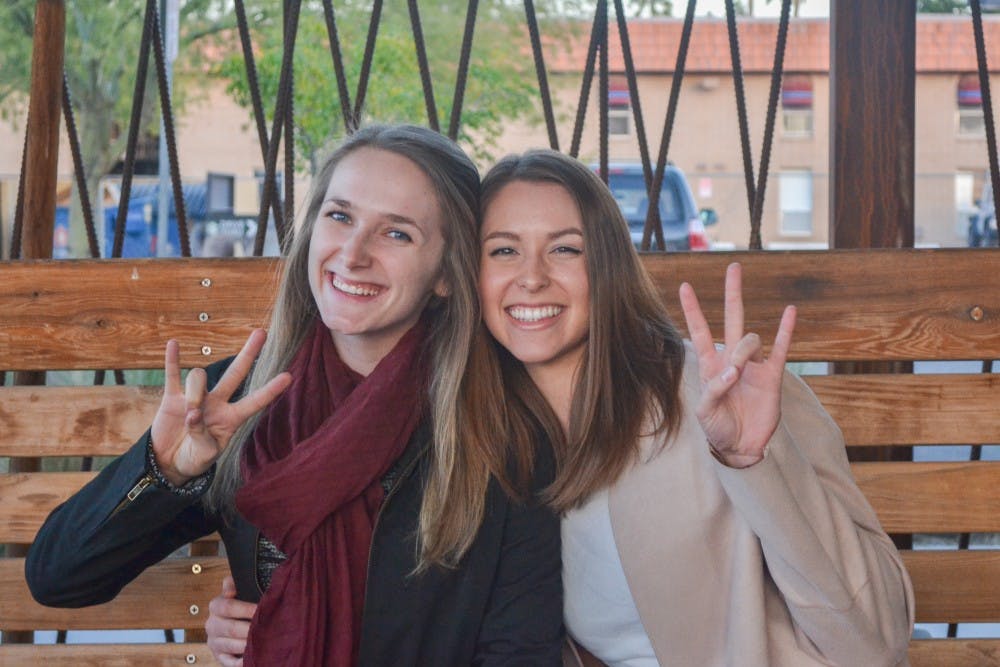Sonia Sabrowsky and Madison Sutton were seniors in high school when their friend killed themselves.
As they tried to cope with the death of their friend, they felt as if their high school handled the situation poorly. Sutton said that although the school provided a counselor for close friends of the student to talk to, school officials opted to move past the situation due to concerns that the death would trigger other students.
“We really didn’t get the support that we needed,” Sutton said. “We were trying to heal ourselves, and one of the ways that we went about healing was to help others not have to go through that situation.”
Sabrowksy and Sutton were interested in mental health advocacy as freshmen at ASU, and they received an extra push from the Tillman Scholars Program which encourages students to pursue solutions for social issues.
Sabrowsky, a senior majoring in biochemistry and psychology, and Sutton, a senior majoring in global studies and psychological sciences, founded the Home Base Initiative in January 2018. The nonprofit provides mental health resources to students and educators while promoting a sense of community.
Their website features a collection of online mental wellness sites and programs that range from meditation to an online peer-to-peer support group.
Additionally, the duo is working on providing resources for parents and family members of students struggling with mental health.
Home Base Initiative’s resources for educators include literature and research-backed programs that allow educators, teachers and schools to provide solutions and other helpful resources all in one place.
“There’s so many ways to take care of your mental health, and it doesn’t have to be retroactive,” Sabrowsky said. “A lot of it should be proactive like making sure that you’re surrounding yourself with these positive, healthy, supportive friendships rather than these toxic friendships."
Last spring, Sutton and Sabrowsky received the Woodside Community Action Grant, a seed-funding competition that awards students with funding for service-based projects..
The two dedicated the majority of their grant to a “Wellness Week” that took place at a Valley high school in October 2018.
The event featured group activities to promote healthy thinking and building a healthy community, such as yoga and a dog costume contest.
This semester, Sutton and Sabrowsky plan to roll out a pilot program at a local high school where they can meet weekly or bi-weekly with students to focus on addressing mental health risk factors. If the pilot is successful, they hope to integrate the program into other schools.
Taking steps to improving one’s mental health can be challenging. Aaron Krasnow, the associate vice president of ASU’s counseling services, said it’s the most difficult step for students to take, sometimes because of the stigma surrounding mental health.
“If you’re thinking about getting help, it must mean that something in your life isn’t going the way you might want it to go, and that’s all we’re there to do, to help you live the life you want," he said.
ASU is working on an electronic health record that will allow students to schedule appointments online, Krasnow said, and the program is expected to launch by the end of 2019.
Krasnow said ASU offers a free counseling session for first-time visitors, and most of the time one session is all they need. Students must pay for follow up sessions, but the fee can be waved if they do not have the means to do so.
Additionally, the University offers student-led support groups such as Devils 4 Devils, along with a 24-hour crisis line.
ASU also recently partnered with TAO Connect, an online therapy and self-help tool that provides training modules to help improve students' mental health. This program is available to any ASU student for free as long as they sign up with their ASU-affiliated email.
Read more: ASU partners with online therapy service TAO Connect to bring better resources to students
“When people feel like there’s not likely to be a payoff, or the pain of asking for help is going to be greater than the pain of staying the same, they’re not likely to ask for help,” Krasnow said. “But if you say to them, ‘You know what, you want something to be different, and this is a way to help you have that difference,’ often that’s a pretty good way to move them into the space of help-seeking.”
Reach the reporter at nschon@asu.edu and follow @schonn2 on Twitter.
Like The State Press on Facebook and follow @statepress on Twitter.




